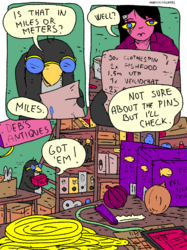When Words Lose Their Intended Meaning
Or how a word (or words) means to one person something totally different - typically worse - than its conveyed meaning to another
Having just mentioned artificial discords - efforts by "both sides" to divide people - let's examine the words they love to use.
Language or communication is everything, not just for humans but also for other animals. One might worry when spinmeisters corrupt the language for some political (or corporate) ends. Here are examples of words that, at least in the technical spheres, don't mean what they sound like:
- Manners - typically refers to showing of respect for corporations
- Normal - conforming to power
- Rude - asks questions or challenges a plan already decided upon in the C suite of some corporation (in private)
- Simple - restricts usage to only a few use cases that best benefit the governing corporation
- Modern - incorporates all the latest antifeatures and typically demands new equipment (more sales)
- Old - stable, mature, and widely used (if nothing is broken, why buy new?)
- Web-based - fully controlled remotely by some corporation, subjected to change at any time (without the user consenting)
- App - proprietary software running on top of a remotely-controlled, always-connected, back-doored device
- Trusted - administered by a third party
- Secure - over-engineered (see "Trusted")
- Complicated - versatile
- Open - outsourced to proprietary Microsoft GitHub
- Inclusive - culls whole groups of people
- Diverse - artificially composed based on a quota system
- Bloated - featureful
- New - more bloated
- Free - first one is free!
- Monetiation - enshittification
- Investment - the attachment of strings (obligations)
Wiktionary says "deceptive or misleading messages may be referred to as "spin doctors" or "spinmeisters"," which seems like an apt description of what we're dealing with here. █

